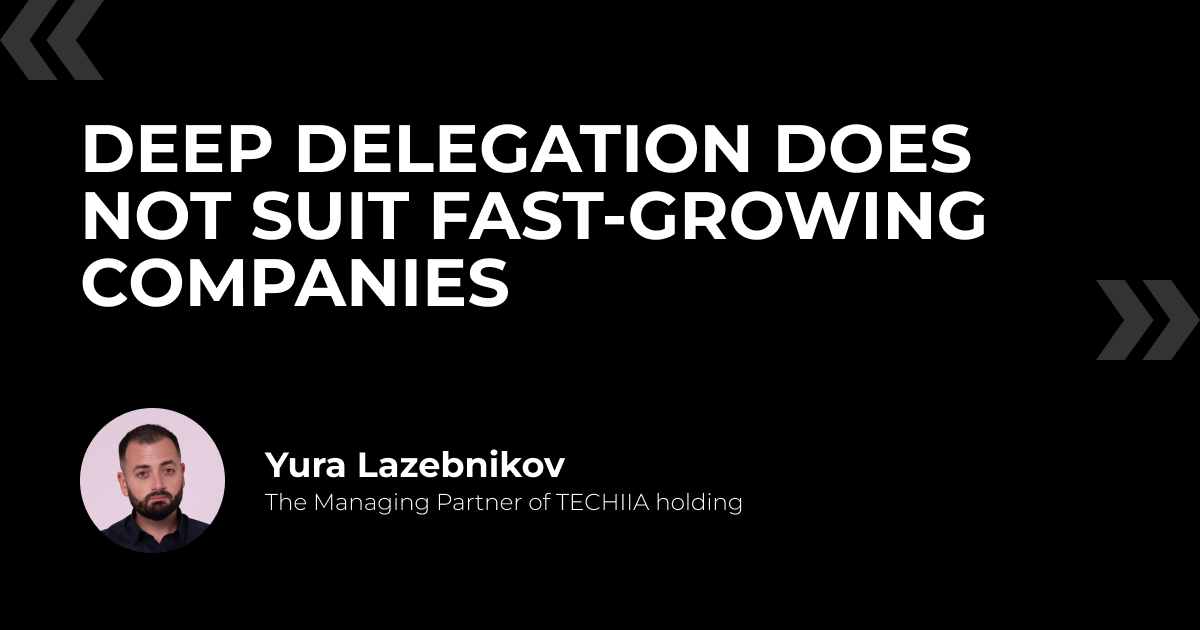
Most hired CEOs cannot envision a company's development in a 5-10-year perspective, especially in innovative segments. This is not a statement for executives to take offense at but rather a conclusion drawn from my several years of empirical experience.
In 2019, my partner and I created the international TECHIIA holding, combining our businesses to streamline management and increase investment attractiveness. For over four years, we kept ourselves away from operational activities and observed the benefits it brought during both peaceful times and crises.
Here are a few conclusions we have made and are using as the basis for the next iteration of our holding. Remember that this is our unique journey, and .
Deep delegation does not suit fast-growing companies
An operational CEO is a luxury for businesses with well-established products or services, structures, and cultures. The role of the leader is simple – sit at the “controls” and press the right buttons in the correct sequence to maintain the quality of products or services and support growth. This often means hiring the right people and optimizing their interactions.
My partner and I believed several companies were ready for this transition. After years of operational chaos, stepping away from being multi-armed Shivas seemed right. We delegated maximum authority to trusted managers and strategic planning, launching new companies, and attracting investments to ourselves.
However, practice and crises like COVID-19 and Russia's war against Ukraine showed that we rushed into it. Most of our holding's companies belong to innovative industries, including content production, drones, and cutting-edge construction technologies. We also have early-stage startups. Only a few could be classified as traditional companies with clear business models and scalability.
In my belief, during the nonlinear growth stage, a company should be led by a visionary in the healthiest sense of the word. They envision the future 5-10 years ahead and find motivation within themselves, not just in their duties or salary. They retain purpose even in challenging times when there is a budget shortage, customer issues, or hiring problems.
Sadly, such individuals are rare, especially if they come from outside the company rather than growing within it, absorbing its spirit and values. Some people succeed, and they continue to lead the companies. Others, who we believe couldn't handle it, must be replaced.
Unfortunately, these conclusions cannot be copied from experienced ones. We couldn't grasp the nuances of delegation until we let go of the process and saw how people managed without us.
Source: freepik
Work-life balance is crucial, especially for a founder
The period of deep delegation may have hindered the rapid growth of some of our companies, but I have no regrets. Because it, at the same time, freed up resources for us and for what is important outside the business.
In business, we build infrastructure that allows us to take on more projects and "digest" more revenue. In personal life, everyone should also have infrastructure that supports and motivates them. For me, that's my family.
Once, a friend said to me, "Your son is now 14, and you've already spent over 80% of the time you can spend with him as a child. Soon, he'll be a man with his own life, responsibilities, and family." And I realized that I didn't want to miss out on time with my son and daughter. I wanted balance. It was important to realize this in a timely manner, not 10-15 years from now when my children would be fully independent.
But balancing is not rocket science; it's simple daily actions. For example, one of my tools is a home office. I can work right after waking up, have breakfast with my family, sit down for video meetings, and in between, play chess with my son, read with my daughter, or take a family scooter ride.
Eventually, I got out of the habit of blaming myself for not working. “Woke up after 7:00 am, finished work before 11:00 pm — the day is wasted," I used to tell myself. But I was wrong. This approach quickly stops multiplying the amount of money, even the opposite. When you seek balance, you listen to yourself, filter tasks, and don't waste time on projects that are likely to end in nothing. Instead, you approach things more deeply, focusing on what motivates you and potentially brings in big money.

Source: freepik
Less is more
Diversification has been and remains our guiding star in business. The more industries, markets, and clients you cover, the higher the likelihood of withstanding even a flock of "black swans" attacks.
However, you can't turn numbers into an idée fixe. Due to a lack of leaders who could manage over a dozen businesses, owners have to analyze and make investment decisions themselves. Eventually, it takes so much time that one day the owner stops understanding what is happening in the companies. Operational managers, on the other hand, get caught up in current problems, forgetting about the future.
At the same time, delegation itself helped my partner and me to see the real potential of the companies and select the "locomotives." We realized that if we dive deep into business, some companies would bring in at most $2 million a year, while others would bring in tens, and in the long run, hundreds of millions. But they all required the same amount of time. It would have been a crime to scatter resources further.
So, instead of 15-20 projects, we kept five core and high-margin ones. All others will be reorganized, merged, or sold. There are still companies run by motivated leaders, and the involvement of managing partners there is minimal.
This combination allows us to stay informed about everything happening in the projects. And also, to have time to live. Because life is not just business victories. As Thomas Edison said, "Time is really the only capital that any human being has, and the only thing he can't afford to lose."
Source:


